With over 8 million tourists visiting Morocco annually, timing is everything to make the most of your trip.
Are you ready to explore the vibrant cities, relax on stunning coastal beaches, or trek through the majestic Atlas Mountains? Understanding the Morocco weather guide is crucial to planning an unforgettable journey.
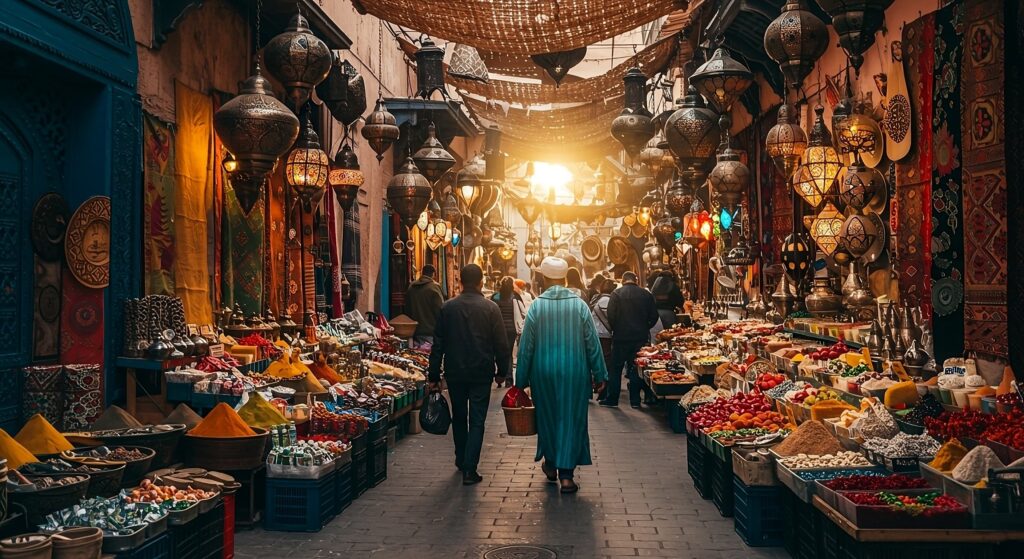
As you prepare for your trip, consider the diverse climate and seasonal variations that Morocco has to offer. From the mild winters to the hot summers, each season brings its unique charm and activities.
By following insider Morocco travel tips, you’ll be able to navigate the best time to visit Morocco and create lifelong memories.
Table of Contents
Understanding Morocco’s Climate and Seasons
Understanding the climate and seasons in Morocco is crucial for planning a successful trip. Morocco’s geography is diverse, featuring coastlines along the Atlantic Ocean, mountainous regions, and desert landscapes, all of which contribute to a varied climate across the country.
Morocco’s Diverse Geographic Regions
Morocco’s climate varies significantly across its different geographic regions. The country’s diverse landscapes, from coastal areas to inland cities and from mountains to deserts, create a range of climatic conditions.
Coastal Areas vs. Inland Cities
The coastal regions of Morocco tend to have a milder climate compared to the inland cities. Cities like Casablanca and Rabat experience a Mediterranean climate, with mild winters and cool summers, while inland cities like Marrakech can be quite hot during the summer months.
Mountain and Desert Climates
The Atlas Mountains offer a cooler climate, ideal for escaping the summer heat or enjoying skiing in the winter. In contrast, the desert regions, such as the Sahara, are known for their extreme temperatures, making them best visited during the cooler months.
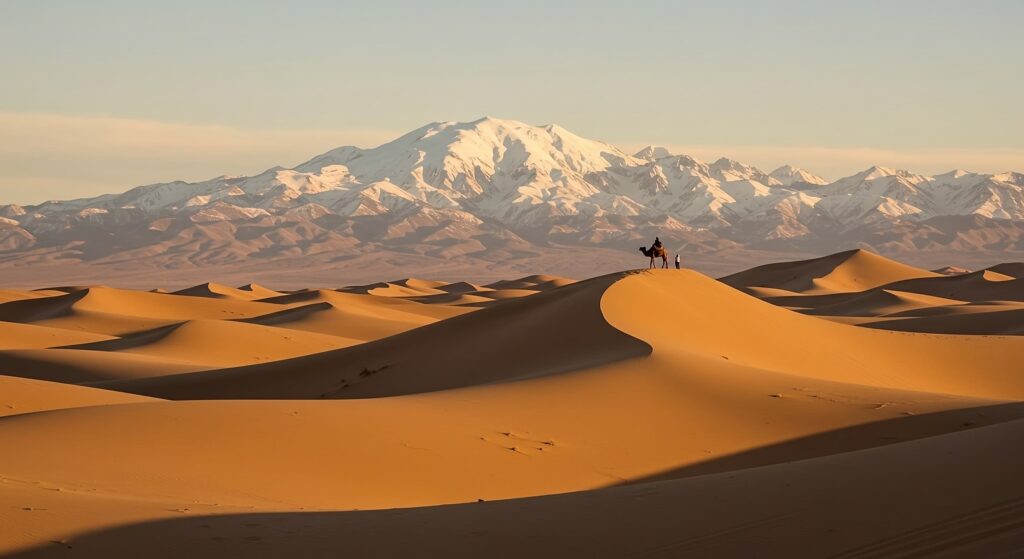
Overview of Morocco’s Four Seasons
Morocco has four distinct seasons, each providing unique travel experiences. Spring (March to May) and autumn (September to November) are the ideal times to visit, thanks to mild temperatures and comfortable weather across most regions. Spring (March to May) and autumn (September to November) are considered the best times to visit, with pleasant temperatures across most regions. Summer can be very hot, especially in the desert and inland areas, while winters are mild in the coastal regions but can be cold in the mountains.
By understanding these seasonal variations, you can plan your trip to Morocco according to your preferences and the activities you have planned.
The Best Time to Visit Morocco: Season by Season
Morocco’s varied climate means that the ideal time to visit depends on your preferences and what you want to do. The country’s diverse geography, ranging from coastal areas to mountains and deserts, contributes to a wide range of weather conditions across different regions.

Peak Season vs. Shoulder Seasons
The peak tourist season in Morocco typically occurs during the spring (March to May) and autumn (September to November), when the weather is mild and pleasant across most regions. These periods are ideal for exploring cities, enjoying outdoor activities, and experiencing the cultural richness of Morocco. The shoulder seasons, which include late spring and early autumn, offer a great balance between comfortable weather and smaller crowds, making them an excellent choice for those who prefer fewer tourists.
When to Avoid Crowds
If you’re looking to avoid the crowds, consider visiting Morocco during the shoulder or off-peak seasons. The summer months can be quite hot, especially in the desert regions, while winters can be cool, particularly in the mountains. By planning your trip during these less busy periods, you can enjoy a more relaxed experience and potentially lower prices for accommodations and tourist services.
Weather Considerations for First-Time Visitors
For first-time visitors, understanding Morocco’s weather patterns is crucial. The country’s climate varies significantly from north to south and from coastal areas to inland regions. Generally, the spring and autumn seasons offer the most pleasant weather, with mild temperatures and fewer extreme weather conditions. It’s important to note that Morocco’s coastal regions generally enjoy milder climates compared to the hotter, more extreme conditions found inland.
By considering these factors, you can plan your trip to Morocco at the best time for your preferences, ensuring a memorable and enjoyable experience.
Spring in Morocco (March to May)
Spring is an ideal time to experience Morocco, with its pleasant weather and rich cultural festivities. As winter fades, the country comes alive with vibrant colors and warmth, making it a perfect season for travelers to explore its diverse landscapes and cultures.
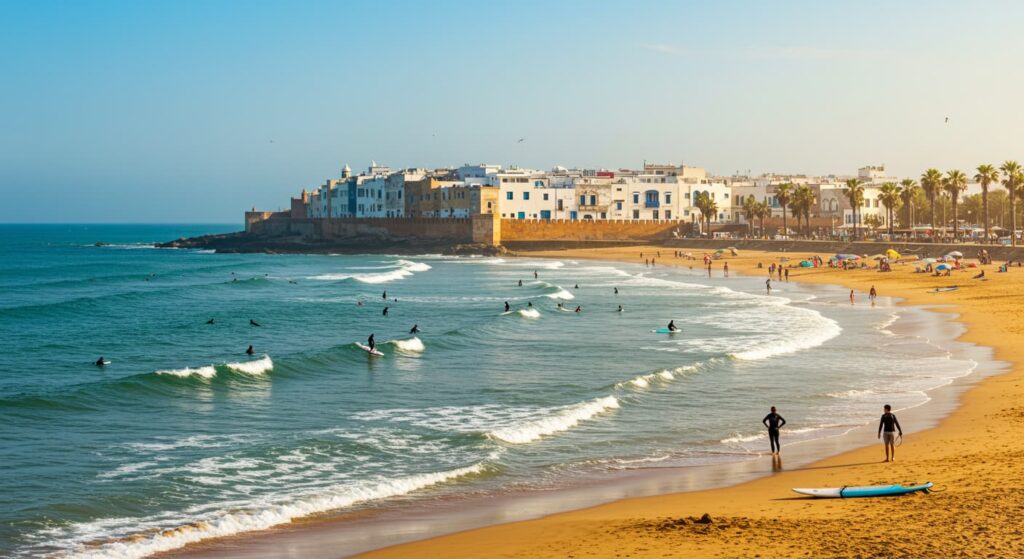
Weather Conditions During Spring
Spring in Morocco brings mild, pleasant temperatures ranging from the mid-60s to mid-70s Fahrenheit (18–24°C), making it one of the best times to visit. The weather is mostly sunny with little rainfall, particularly in the southern regions. This pleasant climate makes spring a great time for outdoor activities like hiking, exploring cities, or relaxing on the coast.
Best Spring Destinations in Morocco
Morocco offers a variety of destinations that are particularly appealing during the spring. The coastal cities and inland destinations each have their unique charm.
Coastal Cities in Spring
Cities like Essaouira and Taghazout are must-visits for surfers and beach lovers. The spring weather provides perfect conditions for water sports, and the laid-back atmosphere makes for a relaxing getaway. Essaouira’s ramparts and beaches are especially beautiful during this time, with gentle breezes and warm sunshine.
Inland Destinations in Spring
Inland cities like Marrakech and Fez, known for their rich cultural heritage, are best explored in spring when the weather is warm but not overly hot—perfect for sightseeing without the summer crowds and heat. You can wander through the bustling souks, visit ancient medinas, and enjoy the local spring festivals. Marrakech’s vibrant atmosphere is particularly captivating during spring, with its gardens and palaces coming alive with color.
Spring Festivals and Events
Spring in Morocco is also a time for various cultural festivals and events. The Marrakech Popular Arts Festival is a highlight, showcasing local music, dance, and crafts. Other events include the Fez Festival of World Sacred Music, attracting artists and visitors from across the globe. These festivals provide a unique window into Moroccan culture and are an excellent way to experience the country’s rich heritage.
Overall, spring is a wonderful time to visit Morocco, with its pleasant weather, rich cultural experiences, and vibrant festivals. Whether you’re interested in exploring coastal cities, delving into the country’s history, or simply enjoying the local cuisine, Morocco in the spring has something for every traveler.
Summer in Morocco (June to August)
Summer in Morocco is a land of striking contrasts, where intense desert heat blends with cool, refreshing coastal breezes. As you plan your trip, it’s essential to understand the weather patterns and how to make the most of your visit during this time.
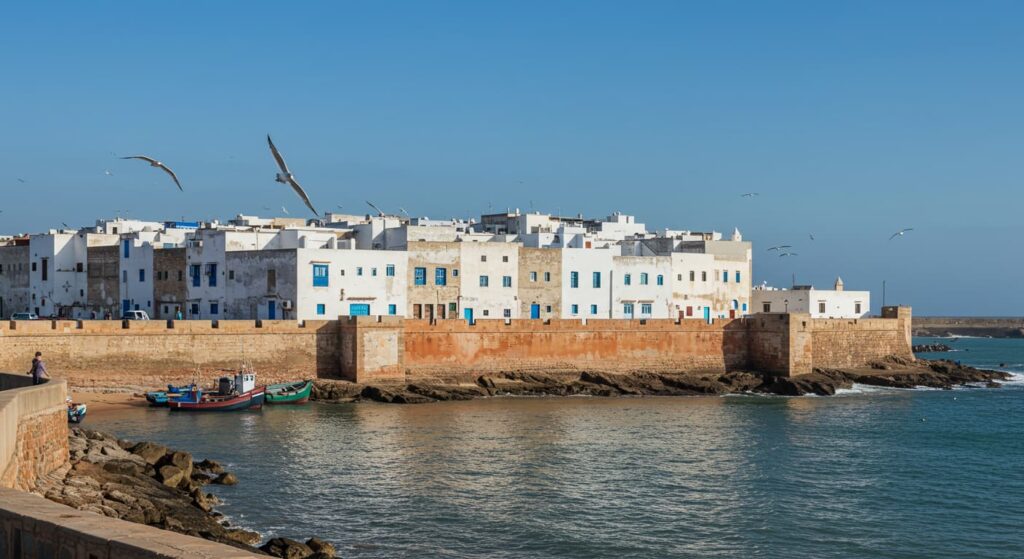
Managing the Heat: Summer Weather Patterns
Summer in Morocco can be quite hot, especially in the desert regions where temperatures often soar above 40°C (104°F). However, the coastal areas tend to be milder, making them ideal retreats from the heat. Understanding Morocco’s seasonal weather is key to planning a smooth and enjoyable trip.
Coastal Retreats and Mountain Escapes
For a cooler summer experience in Morocco, visit coastal cities or high-altitude mountain destinations. These destinations offer a cooler respite and a range of activities to enjoy.
Beach Destinations to Beat the Heat
Here are some of the best beach destinations to visit in Morocco:
- Essaouira, renowned for its windsurfing-friendly beaches and lively art scene
- Taghazout, a surfer’s paradise with consistent waves
- Larache, offering a more laid-back beach experience
The Atlas Mountains provide a refreshing summer escape, featuring cool destinations such as:
- Imlil, a hiking hub with stunning mountain views
- Oukaïmeden, a top destination for skiing in winter and hiking in summer
Summer Cultural Experiences and Festivals
Summer is a great time to experience Morocco’s rich cultural heritage, with various festivals and events taking place across the country. Some highlights include:
- Marrakech Popular Arts Festival: Showcasing Morocco’s rich heritage through music and traditional dance
- The Essaouira Gnawa Music Festival, celebrating Gnawa culture
These events provide a unique window into Moroccan culture and are well worth experiencing during your summer trip.
Fall in Morocco (September to November)
With the arrival of fall, Morocco becomes an attractive destination for travelers seeking pleasant weather and rich cultural experiences. The fall season, spanning from September to November, offers a wonderful opportunity to explore Morocco’s diverse landscapes, from the Atlas Mountains to the Sahara Desert, without the intense heat of the summer months.
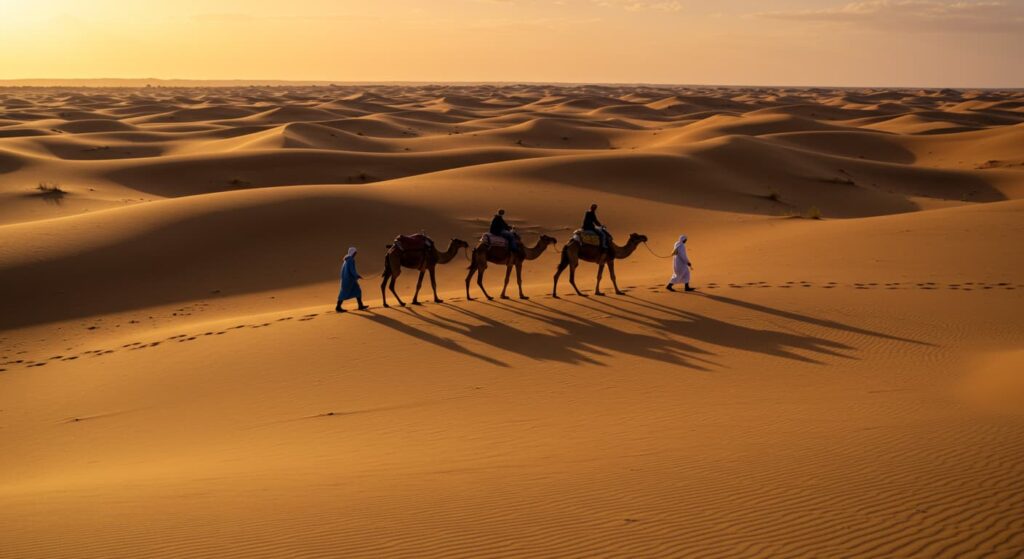
Weather and Conditions in Autumn
Autumn in Morocco offers comfortable temperatures, making it the perfect season for outdoor activities and sightseeing. Generally mild, the weather features average highs between 75°F and 85°F (24°C to 30°C) throughout the country. You can enjoy pleasant desert experiences and vibrant city life without the harsh summer heat.
Ideal Fall Destinations and Activities
Fall is a great time to explore Morocco’s diverse destinations. The desert experiences offer a unique adventure, while city explorations allow you to immerse yourself in Morocco’s rich history and culture. Some of the top activities include:
- Exploring the Sahara Desert
- Visiting historic cities like Marrakech and Fez
- Enjoying local harvest festivals
Desert Experiences in Fall
The Sahara Desert is less crowded in the fall, providing a serene and peaceful experience for visitors. You can enjoy camel treks, desert camping, and stargazing in the clear autumn skies.
City Explorations in Fall
Morocco’s cities, such as Marrakech and Fez, are vibrant during the fall season. Discover Morocco’s historic medinas, iconic landmarks, and delicious cuisine without the busy summer crowds.
Harvest Festivals and Cultural Events
Fall marks the season of harvest festivals and vibrant cultural events across Morocco. You can participate in local celebrations, such as the Apple Festival in the Atlas Mountains, and experience the country’s rich cultural heritage.
For more information on planning your trip, check out our Morocco Weather Guide and Morocco Travel Tips.
Winter in Morocco (December to February)
As the winter months approach, Morocco transforms into a diverse winter wonderland, offering a range of experiences from skiing in the Atlas Mountains to exploring the mild southern regions. This season, which spans from December to February, is characterized by varied weather conditions across different parts of the country, making it essential to understand the climate to make the most of your trip.
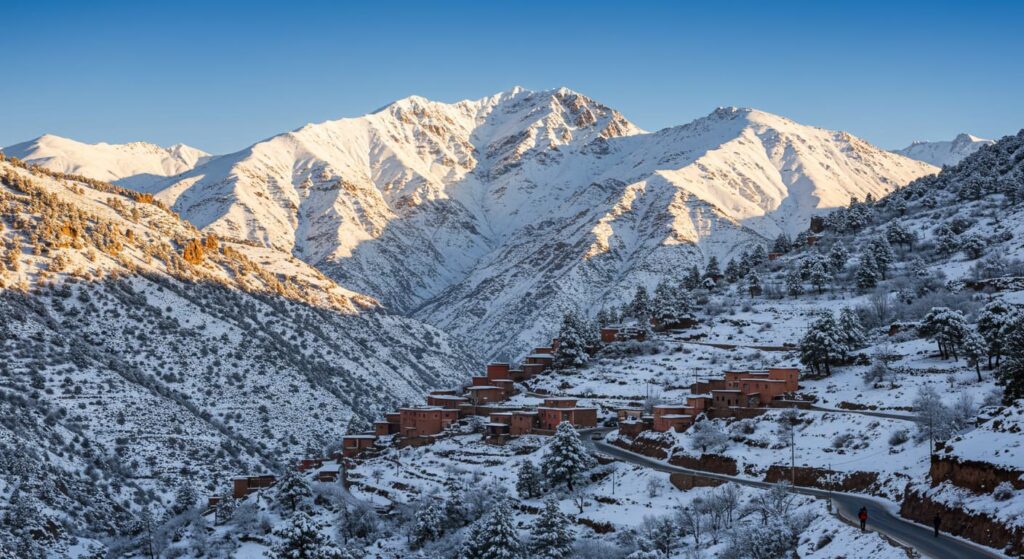
Winter Weather Across Regions
Morocco’s climate in winter varies significantly from one region to another. The Atlas Mountains get ample snowfall, perfect for skiing and snowboarding adventures. In contrast, the southern regions, including Marrakech and the Sahara Desert, enjoy milder temperatures, often pleasant and sunny. The coast experiences cooler temperatures, though they are milder than those found in the mountains.
Winter Activities from Skiing to Desert Trips
Winter is an excellent time to enjoy a variety of activities in Morocco. For adventure seekers, the Atlas Mountains offer great skiing opportunities at resorts like Oukaimeden. Meanwhile, the desert regions beckon with their serene landscapes and comfortable temperatures, perfect for desert trips and camel treks.
Atlas Mountains in Winter
The Atlas Mountains are a winter sports enthusiast’s paradise, with several ski resorts offering slopes for all levels. Oukaimeden, a top-rated ski resort in Morocco, features some of North Africa’s highest ski lifts and offers excellent snow conditions throughout the winter season.
Southern Morocco in Winter
In contrast to the snowy mountains, southern Morocco enjoys a mild winter, making it an ideal time to explore cities like Marrakech, visit ancient kasbahs, or take a leisurely camel ride through the Sahara Desert’s dunes.
Winter Celebrations and Traditions
Winter in Morocco is also a vibrant season filled with cultural festivals, local traditions, and timeless celebrations. The country observes several festivals and holidays during this period, including the New Year (January 1st) and the Amazigh New Year, which is celebrated in the Atlas Mountains. These events offer a unique glimpse into Moroccan culture and are definitely worth experiencing.
Whether you’re looking for adventure, cultural immersion, or simply a relaxing getaway, Morocco in winter has something to offer. With its stunningly diverse landscapes and deep cultural heritage, Morocco offers something for every type of traveler, from adventure seekers to culture enthusiasts.
Best Times for Different Types of Travelers
Morocco’s varied geography and climate mean that there’s a best time for every type of traveler to visit. Whether you’re looking for a family-friendly vacation, an adrenaline-packed adventure, or a culturally enriching experience, understanding the optimal travel times can make all the difference.
Family Travel to Morocco
Families traveling to Morocco will find the spring (March to May) and fall (September to November) seasons ideal. The weather is mild and pleasant, making it perfect for exploring cities, historical sites, and enjoying outdoor activities like hiking or camel rides in the desert.
- Mild temperatures
- Less crowded than peak summer months
- Ideal for outdoor activities
Adventure Seekers and Outdoor Enthusiasts
For those seeking adventure, Morocco offers a range of activities across different seasons. Winter (December to February) is perfect for skiing in the Atlas Mountains, while summer (June to August) is ideal for desert adventures and trekking.
Key activities include:
- Skiing and snowboarding in winter
- Desert safaris and trekking in summer
- Surfing and paragliding year-round in coastal towns
Cultural and Historical Tourism
Cultural enthusiasts will find Morocco rich in historical and cultural experiences. Visiting during the spring or fall allows for comfortable exploration of cities like Marrakech, Fez, and Rabat, with their vibrant souks, historical monuments, and cultural festivals.
Photography and Sightseeing
For photographers and sightseers, the best time is often during the shoulder seasons when the light is soft, and the crowds are smaller. The landscapes are particularly stunning during spring when everything is in bloom, and the autumn foliage adds a warm glow to the scenery.
Tips for photographers:
- Golden hour provides the best light
- Capture the vibrant souks and markets
- Don’t miss the stunning landscapes at sunrise or sunset
By considering the type of travel experience you’re looking for, you can plan your trip to Morocco during the optimal time, ensuring a memorable and enjoyable journey.
Traveling to Morocco During Ramadan and Religious Holidays
If you’re planning a trip to Morocco during Ramadan, it’s important to be aware of local customs and cultural practices. As a predominantly Muslim country, Morocco observes Ramadan as a sacred time of fasting, prayer, and spiritual reflection.
What to Expect During Ramadan
During Ramadan, the daily rhythm changes. You’ll notice that many restaurants are closed during the day, and business hours may be adjusted.
Business Hours and Restaurant Availability
Many restaurants are closed during the day, but some may be open in the evening after sunset. It’s a good idea to plan your meals in advance or eat at hotels that cater to tourists. Business hours can be shorter, so plan your activities accordingly.
Special Ramadan Experiences
Ramadan offers a unique opportunity to experience Moroccan culture. You can enjoy traditional iftar meals, watch local festivities, and participate in the vibrant atmosphere.
Other Important Religious Observances
Apart from Ramadan, Morocco celebrates other significant religious holidays, such as Eid al-Fitr and Eid al-Adha. Understanding these celebrations can enrich your travel experience and help you respect local customs.
Traveling to Morocco during religious holidays can be a rewarding experience if you’re prepared. By understanding and respecting local traditions, you can have a more meaningful and enjoyable trip.
Budget Considerations: Peak vs. Off-Peak Travel
Understanding the peak and off-peak travel seasons is crucial for managing your budget in Morocco. The country’s tourism industry is significantly influenced by the time of year you choose to visit, affecting everything from accommodation prices to tour costs.
High Season vs. Low Season Pricing
The distinction between high and low season in Morocco can greatly impact your travel expenses. During peak travel seasons—especially in spring and autumn—accommodation and tour prices in Morocco often rise due to higher demand from tourists.
Accommodation Price Variations
Accommodation prices in Morocco can vary widely between peak and off-peak seasons, with significant savings available during quieter travel periods. For instance, a luxury riad in Marrakech might charge double during the peak season compared to the off-season. Here are some key points to consider:
- Peak season (spring and autumn): Higher prices, especially during major festivals and holidays.
- Off-peak season (summer and winter): Lower prices, with potential for negotiation, especially for longer stays.
Transportation and Tour Costs
Transportation and tour costs also vary with the season. During peak travel times, popular tours and transportation services may charge more, and booking in advance is essential.
Finding the Best Travel Deals
To make the most of your budget, consider the following tips for finding travel deals in Morocco:
- To lock in the best rates, it’s recommended to book your accommodations and tours in Morocco well in advance, especially during peak travel seasons.
- Consider booking package deals that bundle accommodations, meals, and activities for added convenience and cost savings during your Morocco trip.
- Traveling during Morocco’s shoulder seasons—between peak and off-peak periods—offers the perfect balance of pleasant weather and more affordable prices.
By being mindful of the peak and off-peak travel seasons, you can plan a trip to Morocco that fits your budget, whether you’re looking to splurge or save.
Conclusion: Planning Your Perfect Moroccan Adventure
With its diverse climate and rich cultural heritage, Morocco offers a unique travel experience. Understanding the best time to visit Morocco is crucial to making the most of your trip.
By considering the Morocco weather guide and Morocco travel season, you can choose the ideal time for your adventure. Whether you’re seeking a peaceful retreat or an adventure-filled experience, Morocco delivers unforgettable travel opportunities for every type of traveler.
From bustling vibrant cities to tranquil desert landscapes, your unforgettable Moroccan adventure is ready to begin. Plan your trip according to the Morocco travel season, and you’ll be sure to have an unforgettable experience.
FAQ
What is the best time to visit Morocco?
The best time to visit Morocco is during spring (March to May) and fall (September to November), when mild, comfortable weather creates perfect conditions for exploring vibrant cities, lounging on coastal beaches, or trekking the scenic Atlas Mountains.
Is Morocco hot during the summer?
Yes, Morocco can be quite hot during the summer, especially in the desert regions. However, the coastal areas and mountain retreats offer a cooler respite from the heat, making them great destinations for summer travel.
Can I ski in Morocco?
Yes, Morocco has several ski resorts in the Atlas Mountains, including Oukaïmeden and Mischliffen. The optimal time for skiing in Morocco is during the winter months, from December to February, when the snow conditions are at their best.
What are the peak tourist seasons in Morocco?
The peak tourist seasons in Morocco are during the spring (March to May) and fall (September to November), when the weather is pleasant and comfortable.
Are there any cultural or religious events I should be aware of when traveling to Morocco?
Yes, Morocco celebrates various cultural and religious events throughout the year, including Ramadan and other Islamic holidays. Being aware of these cultural nuances will help you experience Morocco with greater respect and cultural sensitivity.
How does Morocco’s climate change across its various regions?
Morocco’s climate varies greatly depending on the region. The coastal areas tend to be mild, while inland cities can be quite hot during the summer. The mountainous regions are ideal for skiing in winter, and the desert climates are best avoided during the peak summer months.
Can I visit Morocco during Ramadan?
Yes, you can visit Morocco during Ramadan, but be aware that business hours and restaurant availability may change during this time. Additionally, you can experience special Ramadan events and traditions.
How can I save money on my trip to Morocco?
Traveling during the off-peak seasons can help you save money on accommodations, transportation, and tour costs. You can also find better deals by planning your trip in advance and being flexible with your travel dates.
What essential clothing should I pack for a trip to Morocco?
The type of clothing to pack for Morocco depends on the time of year and the regions you plan to visit. Lightweight, breathable clothing is ideal for Morocco’s hot summers, while layering with warmer garments is essential during the cooler winter months. Comfortable shoes are a must for exploring cities and trekking through the mountains.
Are there any specific health or safety concerns I should be aware of when traveling to Morocco?
Morocco is generally a safe country to visit, but as with any travel destination, it’s essential to take necessary precautions to stay safe. You should also be aware of any health concerns, such as heat exhaustion during the summer months.
Reviews
There are no reviews yet. Be the first one to write one.
